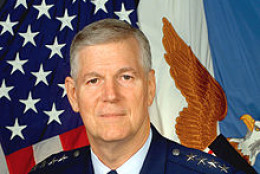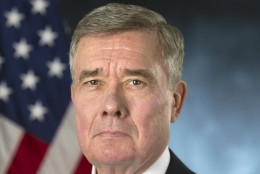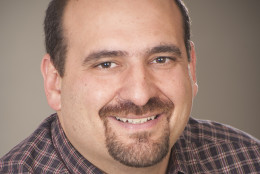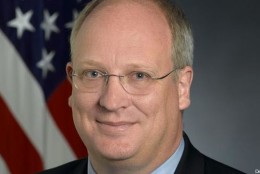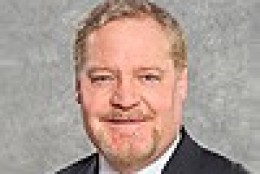Hubbard Radio Washington DC, LLC. All rights reserved. This website is not intended for users located within the European Economic Area.
On Air: Federal News Network
Radio Interviews
-
The Defense Department's nuclear forces arsenal is getting a close look for affordability. Think tanks like the Government Accountability Office and even the Pentagon itself are all looking at how much money the agency should spend on nuclear stock. Todd Harrison is senior fellow for defense budget studies at the Center for Strategic and Budgetary Assessments. He tells In Depth with Francis Rose why he thinks it's important to look at nuclear forces in the context of the whole weapons inventory.
July 31, 2015 -
Marine Corps Gen. Joseph Dunford will be the new chairman of the Joint Chiefs of Staff. He'll begin his term October first when the current chairman — Army Gen. Martin Dempsey — retires. Retired Air Force Gen. Richard Myers was chairman of the Joint Chiefs of Staff from 2001 to 2005. He tells In Depth with Francis Rose about the challenges he walked into on his first day as chairman and how they might compare to what Dunford has on his plate.
July 31, 2015 -
The largest federal law enforcement agency needs more agents to investigate its own. The Integrity Advisory Panel at Customs and Border Protection is calling for nearly 350 new internal affairs investigators to root out what it calls "systemic corruption." The group's report also urges officials to revise some policies and recommends specific restrictions on the use of firearms. Gil Kerlikowske is the commissioner of Customs and Border Protection. He joined Tom Temin on the Federal Drive with his reaction to what the advisory panel is recommending.
July 31, 2015 -
The National Institute of Standards and Technology produces prodigious amounts of data. Now it wants your help to make that data more accessible. NIST has launched a contest to create and design an app using some of its data sets. Heather Evans is a challenge manager at NIST. She joined the Federal Drive with Tom Temin with more on the contest.
July 31, 2015 -
Some 10,000 diseases are known to medicine, but only 500 have established treatments. Today, it takes around $2 billion and up to a decade to bring a single new drug to market. From 2007 to 2012, private-sector investment in medical innovation in the United States fell by $13 billion. Meanwhile, investments increased around the world. One source of the problem might be the Food and Drug Administration. Janet Marchibroda is director of the Health Innovation Initiative at the Bipartisan Policy Center. She joined Tom Temin on the Federal Drive with some recommendations on how to improve the way the FDA carries out its mission.
July 31, 2015 -
The Homeland Security Department is committing $250 million in spending to the professional services governmentwide acquisition contract known as OASIS. DHS signed a memorandum of understanding with GSA detailing its commitment. Todd Richards is the OASIS contract program manager at the General Services Administration. Federal News Radio Executive Editor Jason Miller talked to Richards at the National Contract Management Association’s World Congress in Dallas and has more details about the MOU with DHS.
July 30, 2015 -
The Office of Management and Budget is working on new cybersecurity guidelines for contractors in the wake of two major breaches. Contractors already have five major expectations for their own cyber programs from the National Institute of Standards and Technology. Larry Allen is president of Allen Federal Business Partners and writes the Week Ahead newsletter. He tells In Depth with Francis Rose that your company can't get into the cybersecurity game without perfecting and securing its own network first.
July 30, 2015 -
The President-elect's transition team has only 77 days to get up to speed before the future President takes office. Several initiatives in Washington are already looking at how to make that transition easier. Martha Kumar takes a look at management during presidential transitions and the early days of a new administration in her new book: ''Before the Oath — How George W. Bush and Barack Obama Managed a Transfer of Power". She tells In Depth with Francis Rose about some of the most pressing issues that transition teams face.
July 30, 2015 -
Leidos wins a $4.3 billion contract for a new electronic health record from the Pentagon. The acquisition process started two years ago after three draft RFPs, and three potential bidders dropped out or were eliminated. Dave Wennergren is vice president of technology at the Professional Services Council and former assistant deputy chief management officer at the Defense Department. He tells In Depth with Francis Rose that this project is a very big deal.
July 30, 2015 -
Protests aren't the big holdup to defense acquisitions that industry thinks they are. New data from the Congressional Research Service shows protests aren't bad news for acquisitions. It's quite the opposite. Protests tend to push agencies to take action and resolve it themselves. Steve Schooner is co-director of the Government Procurement Law Program at George Washington University. He tells In Depth with Francis Rose about the tough odds that protestors face.
July 30, 2015 -
The Department of Defense is seeing an increase in its projected IT spending for 2016 for the first time in 3 years. The increase is small at 1.6 percent but that's an extra half a billion dollars. Shawn McCarthy is the Research Director at IDC Government Insights. He tells In Depth with Francis Rose where that half a billion could be going.
July 30, 2015 -
'Tis the season. Election season that is. And that means it's time to brush up on the Hatch Act. The 1939 law prohibits certain federal employees from engaging in some forms of political activity. But does it apply to you? In this week's Legal Loop, Debra Roth, a partner at the law firm Shaw, Bransford and Roth, joined Tom Temin on the Federal Drive with some tips for how to stay out of trouble at work during election season.
July 30, 2015 -
If your GPS has ever made you take a wrong turn, you know having a proper address is important. But currently, federal, state, local and private organizations collect that information individually. No national, authorized registry of addresses even exists. That's why the Transportation Department wants to build it — a single, unified national database of addresses. Steve Lewis is the department's chief geospatial information officer. He joined Tom Temin on the Federal Drive with more on the project.
July 30, 2015 -
The Pentagon capped off a more than two-year acquisition process for a new electronic health record today, awarding the contract to a consortium of companies led by Leidos. The new system will eventually roll out to more than a thousand sites around the world. It will replace DoD’s aging records system with a mostly-commercial IT product. More from Federal News Radio’s DoD reporter Jared Serbu.
July 29, 2015


